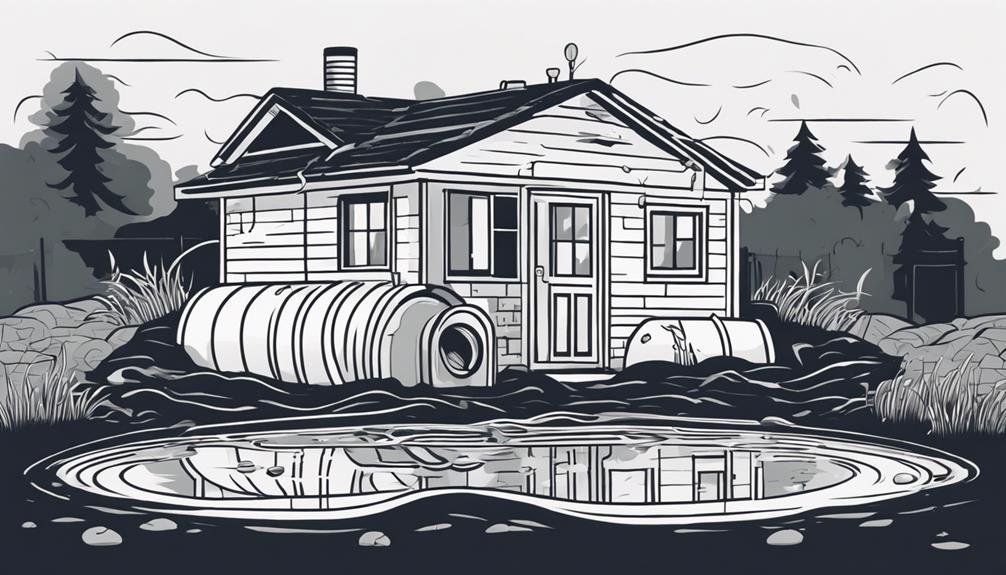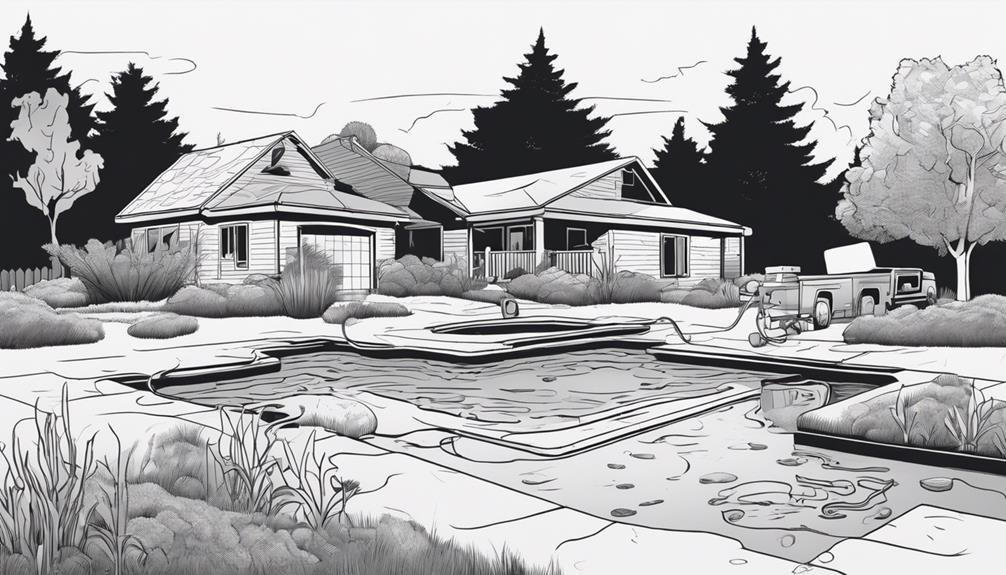You know the saying, 'An ounce of prevention is worth a pound of cure.' Imagine dealing with a septic tank issue. Slow drains and foul odors are just the tip of the iceberg.
What if your system is failing silently, causing costly damage? From clogs to seepage, the problems can be complex.
Stay with us to uncover the silent signs, potential solutions, and how to avoid a literal mess in your yard.
Key Takeaways
- Regular pumping prevents septic tank issues.
- Early detection and repair options for system failures.
- Drainfield maintenance crucial for proper function.
- Prompt action and proper disposal prevent backups.
Signs of a Full Septic Tank

If you notice slow draining sinks, gurgling pipes, or foul odors in your yard, these could be signs of a full septic tank that requires immediate attention. Proper septic tank maintenance, including regular pumping, is crucial to prevent backups and costly repairs. When warning signs like odors and slow drainage appear, it's essential to act promptly to avoid more significant issues.
To address a full septic tank, the first step is to schedule a professional pumping service. Pumping removes the accumulated solids from the tank, allowing it to function efficiently again. Additionally, consider implementing preventive measures such as using septic-safe products and being mindful of what goes down the drains.
Ignoring the signs of a full septic tank can lead to backups, health hazards, and environmental pollution. By staying proactive with septic tank maintenance and addressing warning signs promptly, you can ensure your septic system operates effectively, providing you with the freedom from unexpected and unpleasant surprises.
Symptoms of a Failing System
Detecting symptoms of a failing septic system early is crucial for preventing costly repairs and environmental damage. Here are three key indicators that your septic system may be failing:
- Foul Odors: If you notice persistent foul odors around your property, especially near the drainfield or septic tank area, it could indicate a problem with your system. These odors may be caused by a buildup of sludge or a leak in the system.
- Slow Draining Fixtures: Slow drains in sinks, showers, or toilets throughout your home can be a sign of a failing septic system. This slowdown occurs when the system is struggling to process wastewater effectively.
- Lush Green Grass: While it may seem like a good thing, unusually lush and green grass over the drainfield can indicate a problem. This could mean that the area is being oversaturated with wastewater, signifying a failing system.
If you notice any of these symptoms, it's crucial to address them promptly. Contacting a professional for repair options and following proper maintenance tips can help prevent further damage to your septic system.
Detecting Drainfield Issues

To identify potential drainfield issues with your septic system, conduct a visual inspection of the area for any signs of standing water or overly wet soil. Inspecting the drainfield is crucial in maintaining the overall health of your septic system. Look for lush green grass or pooling water above the drainfield area, as these can indicate problems with the drainage system. Additionally, bad odors near the drainfield may suggest issues with the system's proper functioning.
Regular maintenance is key to avoiding drainfield problems. Be mindful of what goes down your drains to prevent clogs and buildup in the drainfield pipes. Avoid planting trees or shrubs near the drainfield to prevent root intrusion that can damage the system. Pump your septic tank as recommended to prevent solids from clogging the drainfield.
Recognizing Backup and Overflow
Look out for warning signs such as gurgling drains or sewage backups in toilets to recognize potential septic system backup and overflow issues. If you notice any of these signs, it's crucial to address them promptly to avoid further damage and health hazards.
Here are some key points to consider:
- Regular Inspections: Schedule regular inspections by a professional to assess the health of your septic system and catch any potential issues before they escalate.
- Proper Disposal: Ensure that only biodegradable and septic-safe items are flushed down the drains to prevent clogs and backups in the system.
- Prompt Action: If you suspect a backup or overflow, refrain from using water and contact a septic system specialist immediately for assistance.
Preventative maintenance and proper usage are essential in avoiding backup and overflow situations. By being proactive and attentive to warning signs, you can mitigate the risk of costly repairs and ensure the smooth operation of your septic system.
Conclusion
In conclusion, maintaining a septic tank is crucial for the health of your home's drainage system. By addressing common issues such as full tanks, failing systems, drainfield problems, and backups promptly, you can prevent costly repairs and ensure smooth operation.
Just as a well-maintained septic tank keeps your home running smoothly, taking care of these issues promptly will keep your drainage system flowing smoothly like a clear stream in a peaceful forest.

